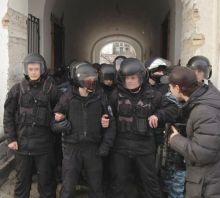The situation around the Hostynny Dvir unfolded in a new way. On February 18 officers of the special police unit Berkut used force towards each and all defenders of the building. They beat, “packed” in police vans, and took to local police offices teenagers, young girls, women, journalists and MPs, activists and concerned Kyiv residents. Among the injuries suffered by the public activists are: bruised internal organs, broken nose, concussion of the brain, and so on. Furthermore, criminal charges were brought against the activists and a number of accusations were put forward, including accusations of hooliganism and swearing. Thus, physical force is used against peaceful and civilized form of protest – educational and cultural events on the territory of Hostynny Dvir, rubber batons are applied against journalists, who show their identity cards, MPs who urge to stop violence, and the community that wants to preserve the architectural monument.
Unfortunately, beating of Ukrainian citizens and activists by Berkut officers became a usual phenomenon. However, beating of people’s deputies who represent the government is already an alarming signal. The thing here is not in the “parliamentary immunity,” which has been widely discussed lately (here we should generally talk about the immunity of human body, about the fact that nobody has the right to beat another person). For, as was accurately noted by journalist and media expert Otar Dovzhenko on his Facebook page, “parliamentary immunity does not mean that nobody can touch an MP. It is simply called that but is applied in cases of bringing an MP to criminal liability. No one can beat an MP just like they can’t beat an ordinary citizen.” The point is that this situation went far beyond simple protection of an architectural monument. According to the experts, it is a link in a chain of targeted actions aimed at a very specific result – prevent Ukraine from joining the EU.
“The level of savagery in Ukraine, including the savagery of the current government is aimed at causing greater confrontation at the summit Ukraine-EU that will be held on February 25, or even simply disrupting it. Thus, the use of force against MPs, decision about withdrawal of mandates from deputies, who have taken the oath, all the fuss around the presidium of the parliament and threats of its forceful unblocking, not to mention the cases of Yulia Tymoshenko and Yurii Lutsenko – this is an entire program of actions designed to prevent Ukraine from getting any chances to join the EU,” Kostiantyn MATVIIENKO, expert at strategic consulting corporation “Gardarika,” explained to The Day. “The things we are now witnessing I would call ‘constitutional cannibalism,’ that is the ultimate stage of savagery. Savage countries can’t become a part of the EU.”
Oleksandr Bryhynets, deputy of the Batkivshchyna Party, who personally experienced the power of guys from Berkut, also thinks that the beating of MPs was not accidental. “The photos show how Berkut officers beat me and a colonel stands next to them and gives them commands. This means that a deputy was arrested by an accident because the officers did not recognize him. It was a deliberate action of beating people’s deputies. Unfortunately, this has become a typical situation already. Think back at what happened at the Main Post Office. The fact that opposition MPs have been deprived of their immunity is very obvious,” Bryhynets told The Day.
Among the victims of Berkut’s beating there are many members of the all-Ukrainian Union Svoboda. “Member of Svoboda Serhii Boiko has a badly injured face, Mykhailo Kublii’s nose is broken. Svoboda MPs Oleh Helevei, Andrii Illienko, and Yurii Syrotiuk have serious injuries. Another Svoboda MP Andrii Mishchenko was arrested and thrown in a police van – this was done against the law of Ukraine ‘On the Status of People’s Deputies,’” reads the official statement on the website of the party. Now they are preparing relevant documents and claims to keep control over the situation. Bryhynets also said: “Today, the most important issue in Ukraine is solving the parliamentary crisis in the situation when the government blocked parliament’s work. Once the parliament is unblocked, we will start solving other issues right away, including this one.”
However, according to Matviienko, it will not be easy. “Deputies have limited arsenal of response actions: petitions, pickets, indignation, parliamentary inquiries – this is the list of traditional legal measures. But it is difficult to apply the law when fists are applied against you,” said the expert. According to him, the fact that deputies physically defended Hostynny Dvir is already an indicator of that legislative protection is not valid. “Our laws are violated a lot. Those laws that are being written and adopted in our parliament do not protect people on the legislative level at all. In this case they had to physically defend a site of cultural heritage,” summed up Matviienko.







